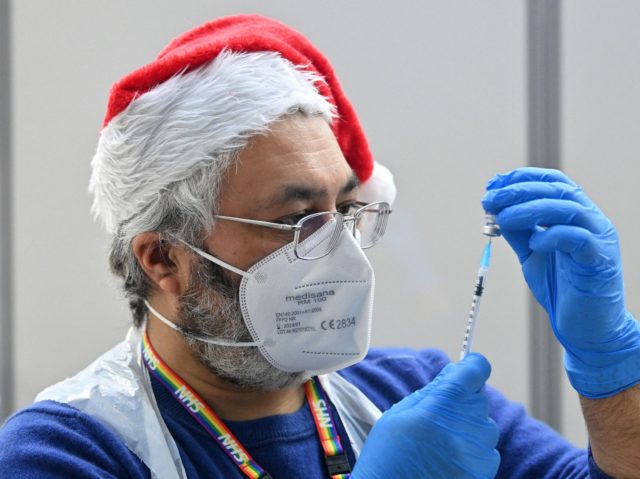UK Ministers are reportedly set to meet as early as Monday in order to discuss implementing new lockdown rules, despite criticisms of the government doomsday modelling predictions.
Amid concerns over the omicron variant of the Chinese coronavirus, British ministers are set to convene by as soon as Monday to possibly reimpose new lockdown restrictions in England.
Dire modelling projections conducted by the Scientific Advisory Group for Emergencies (SAGE) — which advises the government on the Wuhan virus — have reportedly spooked the government into considering more lockdown measures, according to a report by The Guardian.
The SAGE modelling has warned that coronavirus hospitalisations could reach as many as 10,000 per day, alongside 600 to 6,000 deaths per day should the country remain relatively free of restrictions.
The reports provided outcome scenarios should England be plunged into varying lengths of lockdowns, including from the starting point of December 28th to either January 15th or January 28th, or even until March 28th.
The scientific quango said that the government should consider a ban on indoor dining, as well as a ban on meeting people from other households indoors, though it is thought that outdoor mixing will still be permitted.
One government source was keen to play down down the possibility of such restrictions, however, telling The Telegraph that the published government papers had not yet been submitted to ministers for consideration.
SAGE’s modelling has under increasing public criticism, including from Prime Minister Boris Johnson’s own party.
Earlier this week, former Conservative Party leader Sir Iain Duncan Smith said that the government should not “lurch” into an economic crisis just for the “sake of supposition by scientists”.
Senior Tory backbencher and prominent lockdown critic, Sir Charles Walker said: “What had undermined the science and people’s faith in the scientists has been the aggressive use of ultra-worst case scenario modelling. There are many respected scientists who have been deliberately marginalised… There has to be a role and place for challenge.”
Government scientists have, however, been keen to defended their stark predictions.
“The modellers always have to make assumptions and do so across a wide range of possibilities, some optimistic and some pessimistic,” wrote the government’s Chief Science Advisor Patrick Vallance in The Times, adding: “They do not, contrary to what you might have heard, only model the worst outcomes.”
Jenny Harries, the chief executive of the UK Health Security Agency, said that while she is an “optimistic individual”, she said that “omicron is something really quite unusual”.
While the likelihood of future lockdown restrictions in England remains unknown, the government itself has been on a charm offensive regarding the ongoing its booster campaign.
Vaccination in the UK has continued throughout holiday the season, with centres remaining open on Christmas day in order to carry out the promotional “the gift of a jab” campaign for those who have yet to receive their first, second, or third shot.

COMMENTS
Please let us know if you're having issues with commenting.